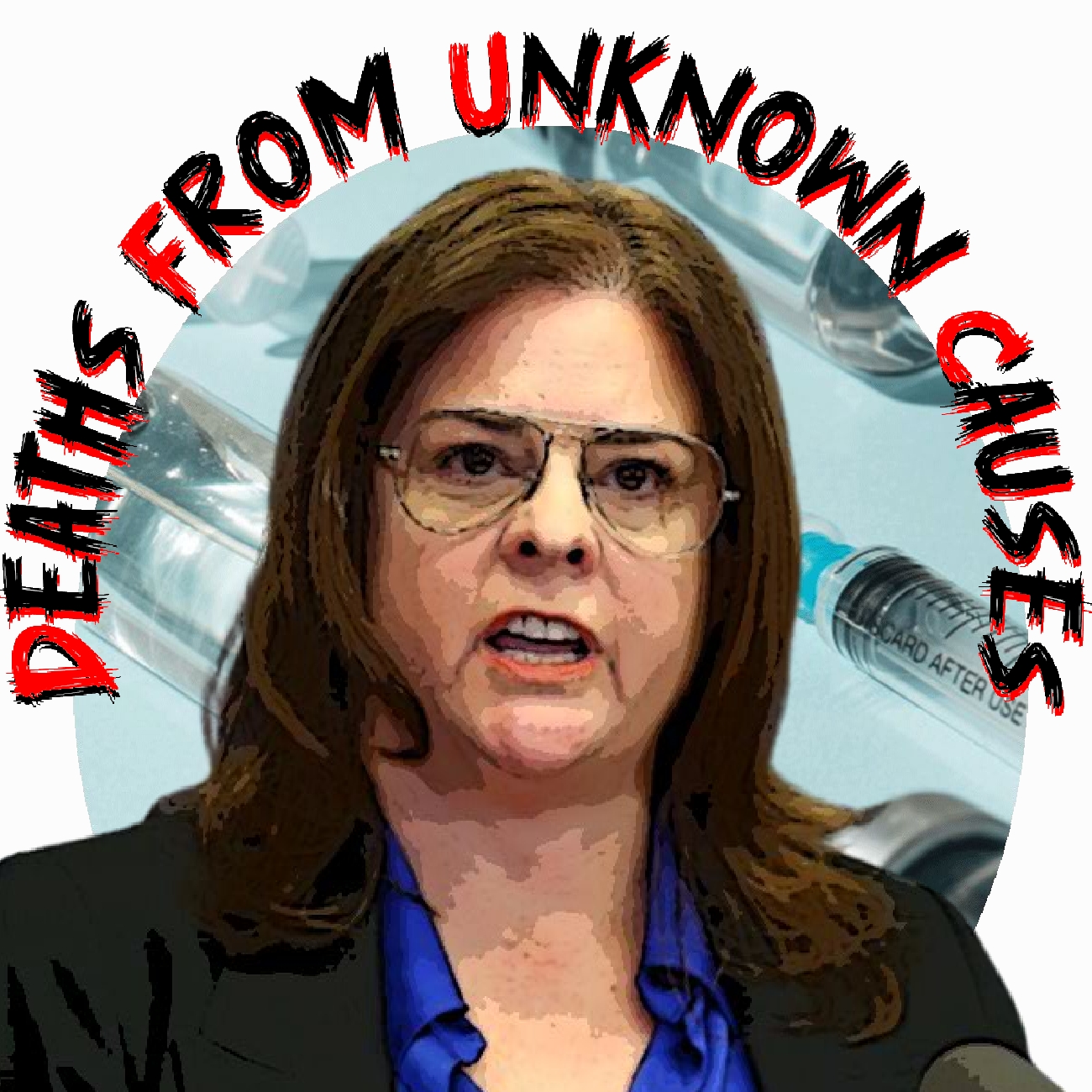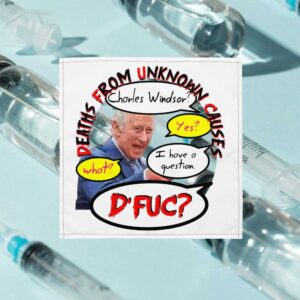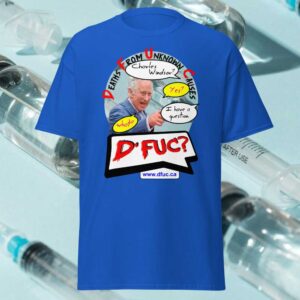

In the ⛹ Old Normal ⛪ (2000-2014)
A typical 75-yr-old elderly man like Charles, living in Canada (Help obtain and display The United Kingdom data) , died at a yearly rate of 437 per 100K, with 197 deaths each year from Unknown Causes.
In the ♿ New Normal ⛺ (2015-2022)
Under conditions devised, promoted, and ultimately imposed by elderly men like Charles, 352 per 100K elderly men 75-79 are dying, with 409 Deaths per year From Unknown Causes
– down 19.5% and up 48.3% respectively. –
Question # 1:
Who is Charles Mountbatten-Windsor?
Charles Mountbatten-Windsor is the full name of Charles III, who became the King of the United Kingdom and other Commonwealth realms following the death of his mother, Queen Elizabeth II, in September 2022. Born on November 14, 1948, he is the eldest son of Queen Elizabeth II and Prince Philip, Duke of Edinburgh. Before ascending to the throne, he was known as the Prince of Wales, a title traditionally granted to the heir apparent of the British monarch. Throughout his life, Charles has been involved in various charitable activities and has expressed strong views on architecture, the environment, and alternative medicine, among other topics. His full name reflects his family lineage, with “Mountbatten” coming from his father’s side and “Windsor” being the name of the royal house.
Question # 2:
List 5 actions taken by Charles Mountbatten-Windsor in response to the WHO declaring COVID-19 a pandemic. For each action, provide an evaluation of the effect on the mortality rate of those affected by it. Support each evaluation by providing a link to a relevant online source which is not controlled or supported, financially or otherwise, by Charles Mountbatten-Windsor.
Prince Charles’s Actions in Response to COVID-19 Pandemic
- Action 1: Launched a coronavirus emergency appeal through the British Red Cross.
Evaluation: This initiative likely contributed to providing essential support and resources, potentially mitigating the impact on affected individuals. However, quantifying its direct effect on mortality rates requires further study.
Source: British Red Cross
- Action 2: Participated in virtual charity events to raise funds for COVID-19 relief efforts.
Evaluation: These efforts helped raise awareness and funds, supporting health systems and vulnerable communities. The direct correlation to mortality rates is difficult to establish without specific data.
Source: Charity Today
- Action 3: Advocated for sustainable and organic farming practices during the pandemic.
Evaluation: While promoting sustainable agriculture is beneficial for long-term health and environmental sustainability, its immediate impact on COVID-19 mortality rates is indirect and not easily quantifiable.
Source: Soil Association
- Action 4: Supported mental health initiatives and charities during the pandemic.
Evaluation: Mental health support is crucial during such crises, potentially reducing stress and improving overall well-being. However, its direct effect on reducing COVID-19 mortality rates is not explicitly documented.
Source: Mind
- Action 5: Encouraged the public to follow health guidelines and get vaccinated.
Evaluation: Promoting adherence to health guidelines and vaccination can significantly impact controlling the viruss spread and reducing mortality. The exact impact of his influence on mortality rates would require targeted research.
Source: World Health Organization
Question # 3:
Given the “New Normal” vs. “Old Normal” mortality data cited above, provide a re-evaluation of the actions taken by Charles Mountbatten-Windsor in his response to the WHO declaring COVID-19 a pandemic. For each action, explain how it may have contributed to these mortality rates.
Re-evaluation of Prince Charles’s Actions in Response to COVID-19 Pandemic
- Action 1: Launched a coronavirus emergency appeal through the British Red Cross.
Evaluation: This initiative likely provided essential support and resources to vulnerable populations, including elderly men. However, it’s unclear how this directly impacted the mortality rates among this demographic.
Source: British Red Cross
- Action 2: Participated in virtual charity events to raise funds for COVID-19 relief efforts.
Evaluation: While these efforts raised funds for health systems and vulnerable communities, it’s difficult to directly link them to the specific changes in mortality rates among elderly men.
Source: Charity Today
- Action 3: Advocated for sustainable and organic farming practices during the pandemic.
Evaluation: While promoting sustainable agriculture is beneficial for long-term health and environmental sustainability, its immediate impact on COVID-19 mortality rates among elderly men is indirect and not easily quantifiable.
Source: Soil Association
- Action 4: Supported mental health initiatives and charities during the pandemic.
Evaluation: Mental health support is crucial during such crises, potentially reducing stress and improving overall well-being. However, its direct effect on reducing COVID-19 mortality rates among elderly men is not explicitly documented.
Source: Mind
- Action 5: Encouraged the public to follow health guidelines and get vaccinated.
Evaluation: Promoting adherence to health guidelines and vaccination can significantly impact controlling the virus’s spread and reducing mortality. However, the exact impact of his influence on mortality rates among elderly men would require targeted research.
Source: World Health Organization
Question # 4:
“Build Back Better” is a UN slogan promoting SDGs. Describe how Charles Mountbatten-Windsor has promoted these ideals in his role as King at British Royal Family. Provide links to examples of Charles Mountbatten-Windsor’s acting out his commitment to sustainable development over the course of his career.
Charles Mountbatten-Windsor\’s Commitment to Sustainable Development
About Build Back Better and SDGs
\”Build Back Better\” is a strategy aimed at reducing the risk to nations and communities from future disasters and shocks, promoting sustainability, resilience, and inclusivity. The United Nations\’ Sustainable Development Goals (SDGs) are a collection of 17 interlinked global goals designed to be a \”blueprint to achieve a better and more sustainable future for all\” by 2030. Charles Mountbatten-Windsor has been a vocal advocate for these principles, integrating them into his work and public engagements.
Environmental Advocacy
Throughout his life, Charles has been a staunch advocate for environmental conservation, climate change action, and sustainable urban development. His initiatives, such as The Prince\’s Rainforests Project and The Prince of Wales\’s Corporate Leaders Group on Climate Change, have sought to address critical environmental issues and promote sustainability.
For more information, visit: Prince\’s Rainforests Project
Sustainable Agriculture
Charles has also been deeply involved in promoting sustainable agriculture practices. His Duchy Originals brand, established in 1990, has been a model for organic farming and has helped to raise awareness about the benefits of organic food and sustainable agricultural methods.
For more information, visit: Duchy Originals
Climate Change Leadership
As a global leader, Charles has used his platform to push for action on climate change, speaking at numerous international conferences and engaging with leaders and policymakers to advocate for sustainable solutions to global warming.
For more information, visit: Speech at Climate Summit
Urban Development and Regeneration
His interest in architecture and urban planning has led to the development of projects like Poundbury, an urban extension to the Dorset town of Dorchester, built on principles of sustainability, community, and traditional design values.
For more information, visit: Poundbury Project








